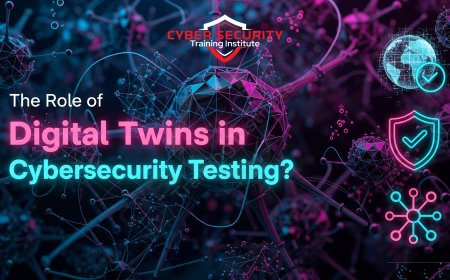What Role Does Blockchain Play in Cybersecurity?
In today’s digital world, cybersecurity is more important than ever. With cyber threats like data breaches, hacking, and identity theft on the rise, businesses and individuals are constantly seeking better ways to protect sensitive information. Enter blockchain—a technology often associated with cryptocurrencies like Bitcoin but with far-reaching potential beyond digital money. Blockchain’s unique structure offers exciting possibilities for strengthening cybersecurity, making it a game-changer in the fight against cybercrime. In this blog post, we’ll explore how blockchain enhances cybersecurity, its practical applications, benefits, and limitations, all in a way that’s easy to understand for beginners and professionals alike.

Table of Contents
- Understanding Blockchain: A Quick Overview
- How Blockchain Enhances Cybersecurity
- Real-World Applications of Blockchain in Cybersecurity
- Benefits of Using Blockchain for Cybersecurity
- Challenges and Limitations
- The Future of Blockchain in Cybersecurity
- Conclusion
- Frequently Asked Questions
Understanding Blockchain: A Quick Overview
Before diving into its role in cybersecurity, let’s clarify what blockchain is. At its core, blockchain is a decentralized, digital ledger that records transactions across multiple computers. Each transaction is stored in a “block,” and these blocks are linked together in a “chain.” What makes blockchain special is its security features: once information is added to a block, it’s nearly impossible to alter without changing every subsequent block, which requires consensus from the network.
Think of blockchain like a notebook shared among a group of friends. Everyone has a copy, and any new entry must be agreed upon by all. If someone tries to erase or change an entry, the others will notice because their copies won’t match. This transparency and tamper-resistance make blockchain a powerful tool for cybersecurity.
How Blockchain Enhances Cybersecurity
Blockchain’s design offers several features that directly address common cybersecurity challenges. Let’s break down how it strengthens digital security:
- Decentralization: Traditional systems store data in a central server, making it a single point of failure for hackers. Blockchain distributes data across a network, so there’s no single target to attack.
- Immutability: Once data is recorded on a blockchain, it’s locked in place. This prevents unauthorized changes, ensuring data integrity.
- Cryptographic Security: Blockchain uses advanced encryption to secure data, making it extremely difficult for hackers to access or manipulate.
- Transparency and Traceability: Every transaction is visible to all network participants (in public blockchains) and can be traced, reducing the risk of fraud.
Real-World Applications of Blockchain in Cybersecurity
Blockchain is already being used in innovative ways to bolster cybersecurity. Here are some key applications:
| Application | Description | Cybersecurity Benefit |
|---|---|---|
| Secure Data Storage | Storing sensitive data like medical records or financial details on a blockchain. | Prevents unauthorized access and tampering due to decentralization and encryption. |
| Identity Management | Using blockchain to verify and manage digital identities securely. | Reduces identity theft by giving users control over their personal data. |
| Supply Chain Security | Tracking products from origin to consumer using a transparent ledger. | Ensures authenticity and prevents counterfeit goods or data manipulation. |
| Secure File Sharing | Sharing files via blockchain to ensure they aren’t altered during transfer. | Protects against man-in-the-middle attacks and data corruption. |
For example, companies like IBM are using blockchain to secure supply chains, ensuring that every step—from manufacturing to delivery—is recorded and verifiable. Similarly, startups are developing blockchain-based identity systems that let users control their data without relying on vulnerable centralized databases.
Benefits of Using Blockchain for Cybersecurity
Blockchain offers several advantages that make it a compelling choice for cybersecurity:
- Enhanced Data Integrity: Because blockchain data is immutable, it’s ideal for protecting critical information like financial transactions or medical records.
- Reduced Risk of Data Breaches: Decentralized storage means hackers can’t target a single server to steal data.
- Improved Trust: Transparency ensures all parties can verify transactions, reducing the need for intermediaries.
- Resistance to DDoS Attacks: Distributed networks are harder to overwhelm with traffic, unlike centralized servers.
- Faster Detection of Threats: Blockchain’s traceability makes it easier to spot unauthorized changes or suspicious activity.
Challenges and Limitations
While blockchain is promising, it’s not a perfect solution. Here are some challenges to consider:
- Scalability: Blockchain networks, especially public ones, can be slow and resource-intensive, making them less practical for large-scale applications.
- Complexity: Implementing blockchain requires technical expertise, which can be a barrier for smaller organizations.
- Cost: Running a blockchain, especially with high transaction volumes, can be expensive due to computational requirements.
- Regulatory Uncertainty: Laws around blockchain are still evolving, creating challenges for adoption in regulated industries like finance or healthcare.
- Not Foolproof: While secure, blockchain isn’t immune to attacks like 51% attacks, where a group controls the majority of the network’s computing power.
Despite these challenges, ongoing advancements in blockchain technology are addressing many of these issues, making it more practical for cybersecurity applications.
The Future of Blockchain in Cybersecurity
As cyber threats grow more sophisticated, blockchain’s role in cybersecurity is likely to expand. Emerging trends include:
- Integration with AI: Combining blockchain’s security with AI’s ability to detect threats could create powerful cybersecurity systems.
- Zero-Knowledge Proofs: These allow data verification without revealing sensitive information, enhancing privacy in blockchain applications.
- Quantum Resistance: Researchers are developing blockchain protocols resistant to quantum computing attacks, ensuring long-term security.
- Wider Adoption: As businesses and governments recognize blockchain’s potential, we’ll see more widespread use in securing critical infrastructure.
The future looks bright, but it will require collaboration between technologists, policymakers, and businesses to fully realize blockchain’s potential in cybersecurity.
Conclusion
Blockchain is more than just the backbone of cryptocurrencies—it’s a powerful tool for enhancing cybersecurity. Its decentralized, immutable, and transparent nature makes it ideal for protecting data, verifying identities, and securing transactions. From safeguarding medical records to preventing supply chain fraud, blockchain is already making a difference in real-world applications. However, challenges like scalability and complexity mean it’s not a one-size-fits-all solution. As technology evolves, blockchain’s role in cybersecurity will likely grow, offering new ways to combat cyber threats. By understanding its strengths and limitations, businesses and individuals can leverage blockchain to build a safer digital world.
Frequently Asked Questions
What is blockchain in simple terms?
Blockchain is a digital ledger that records transactions across many computers. It’s secure, transparent, and hard to tamper with because everyone in the network has a copy.
How does blockchain improve cybersecurity?
Blockchain enhances cybersecurity through decentralization, immutability, and encryption, making it harder for hackers to access or alter data.
Can blockchain prevent data breaches?
While not foolproof, blockchain reduces the risk of data breaches by distributing data across a network instead of storing it in one vulnerable location.
What is decentralization in blockchain?
Decentralization means data is stored across many computers rather than a single server, reducing the risk of a single point of failure.
Is blockchain only used for cryptocurrencies?
No, blockchain is used in many areas, including cybersecurity, supply chain management, healthcare, and identity verification.
How does blockchain ensure data integrity?
Once data is recorded on a blockchain, it can’t be changed without altering all subsequent blocks, which requires network consensus.
Can blockchain be hacked?
While blockchain is highly secure, it’s not immune to attacks like 51% attacks, where a group controls most of the network’s computing power.
What is a 51% attack?
A 51% attack occurs when a group controls over half of a blockchain’s computing power, potentially allowing them to manipulate transactions.
How is blockchain used in identity management?
Blockchain allows users to control their digital identities securely, reducing the risk of identity theft by eliminating centralized databases.
Can blockchain protect against DDoS attacks?
Yes, blockchain’s decentralized structure makes it harder for attackers to overwhelm the network with traffic, unlike centralized servers.
What industries benefit from blockchain in cybersecurity?
Industries like healthcare, finance, supply chain, and government benefit from blockchain’s ability to secure data and transactions.
Is blockchain expensive to implement?
Yes, blockchain can be costly due to high computational requirements, especially for large-scale applications.
Does blockchain work with other technologies?
Yes, blockchain can integrate with technologies like AI and IoT to enhance cybersecurity and functionality.
What are zero-knowledge proofs?
Zero-knowledge proofs allow data verification without revealing the data itself, improving privacy in blockchain applications.
Is blockchain scalable for large organizations?
Scalability is a challenge, but advancements like private blockchains and layer-2 solutions are improving its suitability for large organizations.
How does blockchain help with supply chain security?
Blockchain tracks products from origin to consumer, ensuring transparency and preventing fraud or counterfeiting.
Are there regulatory challenges with blockchain?
Yes, evolving regulations around data privacy and blockchain use can complicate adoption in some industries.
Can blockchain protect medical records?
Yes, blockchain’s encryption and decentralization make it ideal for securely storing and sharing medical records.
Is blockchain environmentally friendly?
Some blockchains, like Bitcoin, consume significant energy, but newer protocols are designed to be more energy-efficient.
What’s the future of blockchain in cybersecurity?
Blockchain will likely see wider adoption, integrating with AI, quantum-resistant protocols, and privacy-focused solutions to combat evolving cyber threats.
What's Your Reaction?
 Like
0
Like
0
 Dislike
0
Dislike
0
 Love
0
Love
0
 Funny
0
Funny
0
 Angry
0
Angry
0
 Sad
0
Sad
0
 Wow
0
Wow
0















